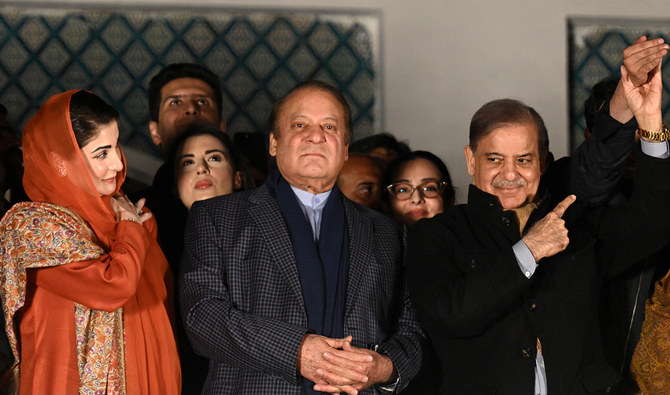ISLAMABAD: A close aide of Pakistan Muslim League-Nawaz (PML-N) supremo Nawaz Sharif, who was seen as the main prime ministerial hopeful, said on Monday the three-time former prime minister would not be his party’s candidate for the PM’s office following Thursday’s national election.
Sharif, who returned to country months ago after having spent years in self-exile, was seen as the favorite candidate for the PM’s office and was widely believed to be backed by the country’s powerful army. Though he denies this and the army says it does not interfere in politics.
The three-time former premier called on allied parties to form a coalition government a day after his PML-N party failed to secure a simple majority in Feb. 8 national election, prompting many people to believe he would once again be taking the PM’s office.
But a senior figure in the PML-N denied on Monday that Sharif would be his party’s candidate for the top slot.
“No Mian [Nawaz Sharif] sahib is not...Mian Shehbaz sahib will be [the prime ministerial candidate],” PML-N leader Khawaja Asif told a reporter in televised comments, when asked who would be his party’s nominee for the prime minister’s post.
Thursday’s vote in Pakistan failed to present a clear winner, with independent candidates, most loyal to ex-PM Imran Khan, winning the highest 101 seats in National Assembly, the lower house of parliament, according to official results.
The PML-N stood at the second position, followed by the Pakistan Peoples Party (PPP) with 54 seats. The rest of the seats went to smaller parties, except for two seats out of which results were withheld on one and election was postponed on the other.
This means the PML-N will have to forge an alliance to form a government in the capital Islamabad and a coalition between the PML-N and former foreign minister Bilawal Bhutto-Zardari-led PPP, who formed the Shehbaz-led government after ousting Khan in April 2022, seems a most likely outcome.
Asked about the nominee for the Punjab chief minister’s post, Asif said his party had “almost made a decision” about who to nominate for the CM’s office, arguably the most influential position after the prime minister’s slot.
Analysts say the South Asian country of more than 241 million faces weeks of political uncertainty ahead following the indecisive election, with several results challenged in courts and rival parties negotiating possible alliances.
The election came at a time when the country is deeply in debt and a new government will be facing the daunting task of negotiating a fresh bailout program with the International Monetary Fund (IMF) after its current $3 billion standby agreement expires in March.
Inflation is galloping at nearly 30 percent, the rupee has been in freefall for three years — losing nearly 50 percent of its value since 2021 — and a balance of payments deficit has frozen imports, severely hampering industrial growth.
















